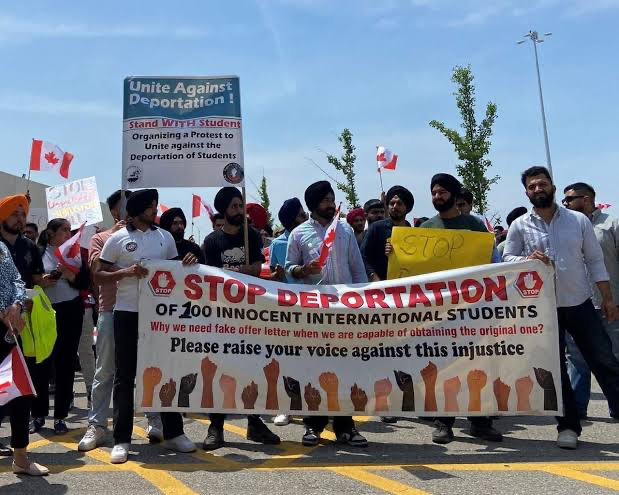In a concerning turn of events, Indian students, predominantly from Punjab, have staged a sit-in protest against Canadian authorities amid looming threats of deportation.
Approximately 700 students, who fell victim to fraudulent agents, have taken to demonstrating peacefully outside the Canadian Border Security Agency (CBSA) office located at 6899 Airport Road, Mississauga, in Ontario province. Seeking justice and an end to deportation, these students have set up tents and are residing under the open sky. The issue of Indian students facing deportation has become a significant concern not only in Canada but also in India. Here are the latest developments in the ongoing protest by Indian students in Canada:
On June 8, Union External Affairs Minister S Jaishankar assured the Punjab government that the Ministry of External Affairs and the Indian High Commission in Canada would assist the approximately 700 Indians facing deportation due to a case involving fake documents. The majority of these students, hailing from Punjab, have claimed to be victims of fraud by their immigration agents, who sent them to Canada with forged college admission offer letters.
Punjab’s Minister of NRI Affairs, Kuldeep Singh Dhaliwal, sought the intervention of Minister Jaishankar, emphasizing that the students were defrauded. Canadian Prime Minister Justin Trudeau has also reassured the 700 affected Indians that each case will be evaluated individually, providing them an opportunity to present their side. The matter came to light in March when these individuals, having completed their studies and secured employment, applied for permanent residency, only to be informed by the CBSA that their college admission letters were counterfeit, resulting in impending deportation.
Details about the protest:
The students, primarily from Punjab, have been gathering outside the CBSA headquarters since May 29, engaging in an “indefinite sit-in” to protest against these deportations. They argue that it would be grossly unjust to expel them from the country where they completed their studies, worked for five years, and lived legally. Most of the affected students arrived in Canada on study visas between 2017 and 2018.
One student, Kramjit Kaur from Punjab, was initially ordered to leave Canada by May 29, but her expulsion orders were temporarily stayed. Another student, Lovepreet Singh from Mohali, Punjab, has been instructed to leave the country by June 13, and he is currently contesting his case in court.
The case revolves around the fact that most of these students arrived in Canada based on admission offer letters provided by a Jalandhar-based agent named Brijesh Mishra. Mishra, who is currently facing a police case and has gone missing, headed a firm called Education Migration Services. He charged each student lakhs of rupees to process their documents. Mishra obtained offer letters for the affected students but later asked them to switch colleges upon their arrival in Canada, citing various reasons.
One affected woman from Jalandhar shared her experience, stating that when she reached Canada in 2018, her agent, who had charged her around Rs16 lakh, advised her to enroll in another college due to the filled seats in the college for which she had received the admission letter. The agent returned some of her money and facilitated her admission to another college, where she pursued her studies. The student only realized the intentions of her agent when she received a deportation letter from the CBSA, exposing the fake admission letter on which her visa had been obtained.
Conclusion:
It is worth noting that the students generally trust their agents, and Canada allows students to switch colleges after arrival, making it less likely for them to verify the authenticity of their offer letters. Consultants and agents facilitating student applications are registered with the state government. However, in this case, Mishra’s agency had its license canceled, and the Jalandhar police have filed a case against him and two accomplices. The involvement of Canadian embassy officials who granted visas based on these fraudulent letters is also being investigated.
In response to the crisis, Canadian authorities have decided not to proceed with immediate deportations of the Indian students ensnared in the immigration scam involving fake university admission letters. A task force has been established to review each case and provide assistance to the victims of this fraud, as announced by the country’s immigration minister, Sean Fraser, on Wednesday.
The protest by Indian students in Canada continues to draw attention, with stakeholders closely monitoring developments and awaiting further updates on the actions taken by both Indian and Canadian authorities.

